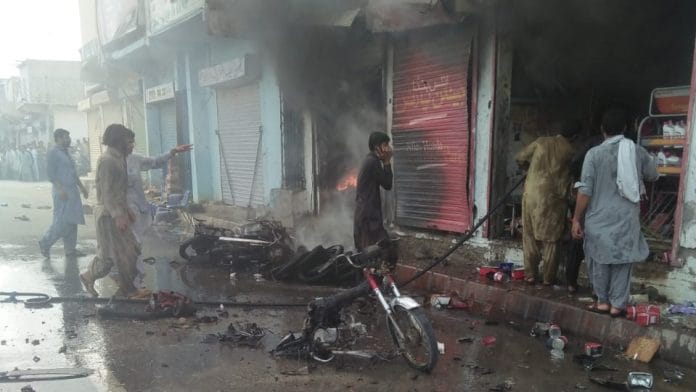New Delhi: Within a span of one week, the banned Baloch Liberation Army (BLA) struck twice at Pakistan’s security forces in Balochistan — at Panjgur and Noshki districts Wednesday and at a check post in Kech on 25 January.
The BLA has been spearheading an insurgency since 2000 and been categorised as a terrorist group by Pakistan, the UK and the US. It was responsible for the June 2020 attack on the Pakistan Stock Exchange building in Karachi (Sindh province), resulting in the killing of one police sub-inspector and four security guards, as well as the April 2021 Quetta blast, which killed at least four people.
The scale of the recent attacks carried out by the BLA has been described as “unprecedented”, and there are suspicions it may be receiving help from banned outfits like Tehrik-i-Taliban Pakistan (TTP) despite their different goals.
Pakistan security analyst Naveed Elahi said in the Pakistan online paper DailyTimes that the attacks in Panjgur and Noshki reflect a “glaring intelligence failure”.
The Pakistani military Thursday alleged the attackers had links to India and Afghanistan. A similar accusation was made against India last year following the Quetta blast.
On Friday morning, more than 36 hours after the initial attack on the Pakistan military’s Panjgur camp, the BLA said it continued to have a hold in the region, claiming it had killed over 100 people.
Earlier, the Pakistan military’s media wing had said attacks in Panjgur and Noshki were “repulsed” but there were “suspected attackers” hiding in the area.
The “contradictory statements” have further fuelled worries about the situation in Balochistan.
Also Read: For Pakistanis, Alvi playing Wordle amid Baloch alert is next level ‘aapne ghabrana nahi hai’
From ‘scattered killings’ to targeting military camps
According to Daud Khattak, journalist at Radio Free Europe/Radio Liberty’s Pashto language ‘Mashaal Radio’, the targeting of military camps is a bold new move.
“Baloch militants are usually involved in scattered target killings and roadside bombings. Now we’re seeing suicide bombings and skilled attacks on military camps,” he told ThePrint.
He added: “The last time we saw attacks this bold was in 2009-11 during the Tehrik-i-Taliban Pakistan’s (TTP) time. There was even the December 2009 mosque attack in Rawalpindi near the Pakistan Army’s headquarters.”
Pakistan journalist Hamid Mir said the TTP could be likely providing support to the BLA to carry out the recent spate of attacks. “They [TTP and BLA] are providing logistical support to each other but ideologically they are different,” he told ThePrint.
The aim of the TTP, which depends on the tribal belt along the Afghanistan-Pakistan border, is to overthrow the Pakistan government and establish an emirate based on its interpretation of Islamic law. The BLA seeks independence from Pakistan and their main complaint is that the Pakistani government has been exploiting resources in Balochistan without sharing any of the proceeds with the local tribes.
Some media reports have alluded to Pakistan PM Imran Khan’s visit to China, for the Winter Olympics, while referring to the situation in Balochistan, but a connection seems unlikely, said Khattak.
“Several analytical pieces are mentioning that these incidents are connected to Imran Khan’s visit to Beijing, but these attacks take time and reconnaissance. They are planned long-term. Khan’s visit was only just recently confirmed,” he added.
BLA’s ‘increased military capacity’, ‘links with TTP’
Ayesha Siddiqa, senior fellow at the Department of War Studies in King’s College, London, called the attacks “unprecedented”.
“The sudden increase in the BLA’s military capacity is so far unexplained but so is what it took for the military to regain control. This is why the attacks seem unprecedented,” she told ThePrint.
Siddiqa also said the BLA adopting strategies so far used by the TTP raises questions.
“BLA’s increased capacity is worth attention. Are they partnering with the TTP, which is known for these kinds of operations or some other element?” she said.
According to Siddiqa, there is a need to look at the changing leadership of the Baloch separatists coupled with the factor of military repression in Balochistan in recent years.
“The Baloch insurgency is changing. The new leadership is now middle class and are likely tired of state violence. Given their sudden increase in military capacity, I think they would be less ready for any political compromise compared to the overground tribal leaders,” she said.
In recent years, the BLA has gathered support across urban and rural areas of Balochistan, separate from the traditional network of tribal leaders.
She observed that there are growing fears of more attacks of a similar scale.
“With these kinds of unprecedented attacks, the military could justify further action in Balochistan,” she said. “However it’s difficult to understand why despite using gunship helicopters and firepower, they have not managed to regain control. It makes one wonder if it’s some kind of smoke-screen. There’s a major security situation going on that needs to be explained.”
Iran factor
On Friday, Balochistan’s Provincial Home Minister Mir Zia Langove was quoted in The News International as saying that several threats had been issued from various terrorist organisations this month, during which he highlighted the fact that Pakistan shared a border with Iran.
“He said that through the border management committee, Iranian officials had been conveyed Pakistan’s concerns in this regard and had received assurances from the other side,” said the media report.
According to Mir, the BLA shares close ties with Jundullah (the People’s Resistance Movement of Iran), a Sunni insurgent outfit based in Sistan and Baluchestan in southeast Iran, near the border with Pakistan.
Iran and Balochistan share a nearly 1,000-km border.
“BLA has close contact with Jundullah which is active in Iranian Balochistan. They are Sunni extremists fighting for independence and also have an end goal of uniting all Baloch militants,” he said.
This report has been updated to clarify one of the quotes by Ayesha Siddiqa.
(Edited by Sunanda Ranjan)
Also Read: Who are Baloch Liberation Army? Insurgents who killed 30 in Pakistan in last one week






